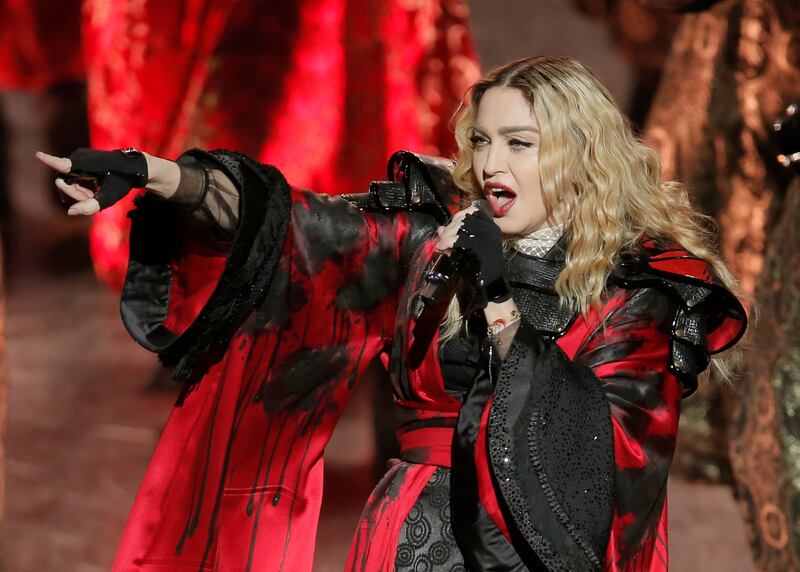In the film version of “Evita,” Eva Peron, played by Madonna, says upon encountering a former paramour, “Your act hasn’t changed much.” The man pointedly replies, “Neither has yours.”
The exchange comes to mind amid the drama following the singer’s appearance at the Grammys Sunday night.
At 64, Madonna’s act hasn’t changed much since 1984, when “Like a Virgin” became her first No. 1 hit. She’s been proudly crossing the lines of propriety ever since, using her given name to build a brand around the mockery of religion. Among her many controversies was wearing a crown of thorns while posing on a cross during a concert and dancing in front of burning crosses in her “Like a Prayer” video.
All the while, she has enjoyed extraordinary success; she is widely known as “the queen of pop” and is the bestselling female artist of all time, according to Guinness World Records.
That’s one reason that it’s perplexing to see Madonna rail against “ageism” and “misogyny” in response to reaction about her physical appearance at the Grammys. In an Instagram post Wednesday, she complained about “a world that refuses to celebrate women past the age of 45 and feels the need to punish her if she continues to be strong willed, hard-working and adventurous.”
She also said she “has been degraded by the media since the beginning of my career.” This is a complaint that is hard to take seriously, given that The New York Times recently published a laudatory article about her upcoming world tour (headlined “With her new tour, Madonna shows she will never go gently. Why would we even want her to?”) and Vanity Fair put her on the cover of its recent “icon” issue, in which she poses as the Virgin Mary, and a stand-in for Jesus at the Last Supper.
Any degradation that has taken place has come not from the media, but her own increasingly bizarre actions. It’s getting harder to be a Madonna fan, even for those of us who have enjoyed her music over the decades while trying to ignore her mockery of our faith and values.
But what of Madonna’s accusation that those who expressed shock at her line-less, taut face are purveyors of agism and misogyny?
There is ageism in American society, for sure, as any woman over 50 can attest, but when 61-year-old Jennifer Coolidge won a Golden Globe last month and spoke about the challenges of getting older, CNN said she “stole the show.”
Similarly, Helen Mirren, 77, and Meryl Streep, 73, are universally beloved and professionally busy. It’s not hard to find examples of older women who are aging beautifully and don’t seem to mind looking — and acting — their age.

Meanwhile, many women who have grown older alongside Madonna (myself included) look at her and have questions. Is resisting the natural changes of aging to the point where people can no longer recognize you a form of ageism itself? Is anyone not dependent on Madonna for a salary giving her advice? And, perhaps most importantly, is there any way that she has matured or grown wiser since her 20s?
The video snippets on Madonna’s Instagram post suggest not. The queen of pop has been hailed as a trailblazer who continually reinvents herself even though her performances are still built on the same tired scaffolding she used in the ’80s: outrage and offense.
Her face may look different, but tragically her act hasn’t changed at all.


